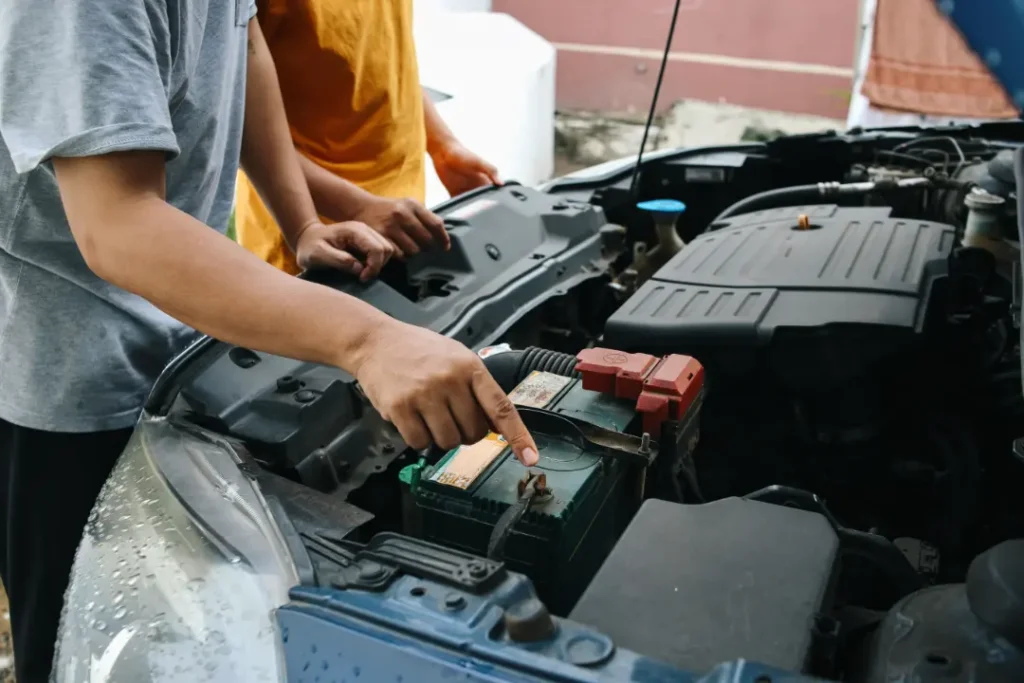Breakdowns often seem like they come out of nowhere, but in reality, many are preventable. By understanding the most common reasons cars and vans fail on the road, you can take simple steps to avoid getting stranded.
From flat batteries to tyre troubles, this guide covers the top 10 most common causes of vehicle breakdowns, plus practical tips to help you prevent them. Whether you’re commuting daily or heading off on a long road trip, a little prep can go a long way toward keeping your vehicle running smoothly.
Let’s take a look at what to watch out for to keep your journey interruption-free.
Key Takeaways
- Regular maintenance of your car’s battery, tyres, and engine cooling system is essential to prevent common breakdowns.
- Prompt attention to warning signs like engine overheating or electrical issues can avert costly repairs and ensure vehicle reliability.
- Practising safe driving habits and regularly checking fluid levels can help mitigate risks associated with misfuelling, clutch problems, and fuel system issues.
Flat Battery
One of the most common causes of car breakdowns is a flat battery. This issue often arises from factors such as old age, leaving lights on, or electrical faults. Extreme weather conditions can also negatively impact battery performance, making it essential to store your cars in a garage whenever possible.
Regularly checking and maintaining your car battery can prevent most unexpected breakdowns due to common causes of breakdowns.
To avoid flat batteries, consider the following tips:
- Charge your car battery every two weeks if you’re not driving long distances.
- Keep the battery terminals clean.
- Ensure all lights and electrics are turned off before shutting the engine off.
If you frequently deal with a flat battery, it may be time to invest in a new one, especially if your current battery is old or showing signs of wear, or if it has become a faulty battery or batteries.
A flat battery can be particularly troublesome during a long journey or in remote locations where help might not be readily available.

Tyre Problems
Tyre problems are another frequent cause of car breakdowns. Issues such as flat tyres, worn tread, and punctures from sharp objects can leave you stranded on the side of the road, where roadside assistance may be necessary. Regularly checking tyre pressure, tread depth, and inspecting for any visible damage can help prevent these problems.
It’s also important to inflate your tyres according to the specific pressure recommended in your vehicle’s manual.
Temporary repairs using sealant can be a quick fix for a flat tyre, but it’s essential to visit the nearest garage for proper replacement to ensure your safety on the road.
Regular tyre care and maintenance are crucial in avoiding tyre failure and ensuring a smooth driving experience. Don’t forget to carry a spare tyre and the necessary tools to change it in case of an emergency.
Driving with worn or damaged tyres can lead to more severe issues, such as wheel damage or loss of control, especially at higher speeds.
By staying vigilant and addressing one tyre problem promptly, you can avoid the inconvenience and danger of a car breakdown.
Engine Overheating
Engine overheating is a common cause of car breakdowns, especially during the summer months or in hot weather. Low coolant levels, modern cooling systems failures, and broken radiators are frequent culprits behind an overheated engine.
Regularly checking your coolant levels and ensuring the cooling system is in good working order can prevent this issue.
If your engine does overheat, it’s crucial to take immediate action:
- Turn off the air conditioning.
- Pull over safely.
- Switch off the engine.
- Wait at least 30 minutes for the engine to cool down.
- Check the coolant levels and add more if necessary.
Be cautious when opening the coolant reservoir, as steam and hot coolant can cause burns.
Ignoring the temperature warning light or signs of an overheated engine, such as steam coming from the engine, can lead to severe engine damage. Regular maintenance and prompt attention to warning signs can help you avoid the costly repairs associated with engine overheating. Keep an eye on your coolant levels and address any potential issues before they escalate.
Alternator Faults
Alternator faults are another common cause of car breakdowns.
Symptoms of a malfunctioning alternator include:
- Frequent battery failures
- Trouble starting the car
- Dimming or flickering headlights.
A noticeable dashboard warning light, typically yellow and shaped like a battery, is often a clear sign of alternator issues, which may indicate a faulty component.
When the alternator fails, it affects the car’s electrical systems, including air conditioning, windows, and interior lights. Unusual sounds like grinding from the engine may also occur if the alternator has significant issues. Addressing these symptoms promptly can prevent further damage and ensure your car remains in good working order.
Repairing or replacing a faulty alternator can be costly, with prices ranging from £250 to £800 depending on various factors. However, regular maintenance and being aware of the warning signs can help you catch alternator issues early.
Starter Motor Issues
Starter motor issues can be particularly frustrating, as they often prevent your car from starting altogether. Symptoms of starter motor problems include a loud clicking noise when turning the key and nothing happening when you try to start the engine.
Loose connections, a weak battery, or a faulty starter motor are common causes of these issues.
Regularly checking your battery and ensuring all connections are secure can help prevent starter motor problems. If you experience trouble starting your car, it’s essential to address the issue promptly to avoid being stranded.
A malfunctioning starter motor can leave you unable to start your car, leading to potential delays and inconvenience.
Preventative maintenance and regular battery checks are crucial in avoiding starter motor issues. By keeping your battery in good condition and addressing any signs of trouble early, you can ensure your car starts reliably every time. Don’t ignore the warning signs of a failing starter motor, as prompt attention can save you from a car breakdown.

Misfuelling
Misfuelling, or putting the wrong fuel in your car, is a surprisingly common issue that can cause severe engine damage.
In the UK alone, approximately 133,000 drivers encounter this problem annually, with incidents occurring as frequently as every three minutes. Misfuelling can damage the fuel system and catalytic converter, leading to costly repairs.
If you accidentally put the wrong fuel in your vehicle, follow these steps:
- Leave the engine off.
- Inform the service station staff immediately.
- Do not start the car to help minimise damage.
- Call for immediate help to drain the fuel from your vehicle.
The draining process can take from several minutes to a few hours, depending on tank accessibility.
Being mindful at the pump and double-checking the fuel type can help you avoid this common and costly mistake.
Clutch Problems
Clutch problems can manifest in several ways:
- Difficulty accelerating
- A burning smell from the gearbox, indicating potential failure
- Unusual noises
- A spongy and sticky feel
A leading cause of premature clutch failure is riding the clutch, or keeping pressure on the pedal while driving.
Driving in heavy traffic can accelerate clutch wear due to frequent engagement and disengagement. Burnt-out clutch cables are a common problem caused by overusing the clutch.
Avoiding heavy lifting and practising smooth gear changes can help extend the life of your car’s clutch, reducing the risk of breakdowns.
If you notice changes in the clutch pedal feel, it’s important to seek professional garage help. Regular maintenance and being mindful of your driving habits can help prevent clutch problems and ensure your vehicle remains in good working order.
Electrical Problems
Electrical problems are among the most common causes of car breakdowns.
Issues include:
- Faulty spark plugs
- High-tension leads
- Wiring faults
These can lead to:
- Rough idling
- Trouble starting
- Engine misfires
Other indicators of electrical issues are:
- Malfunctioning alarm systems
- Blown fuses
Regular tune-ups and servicing of ignition key components are crucial for preventing unexpected electrical problems.
A faulty electronic control unit (ECU) can lead to misreported mechanical faults, impacting overall vehicle functionality. Regular servicing of the ECU is essential to avoid costly repairs due to electrical failures.
Paying attention to warning signs and addressing electrical issues promptly can help you avoid breakdowns and ensure your car remains reliable.

Diesel Particulate Filter (DPF) Issues
Diesel Particulate Filter (DPF) issues are common in vehicles that frequently make short trips at low speeds.
These trips can cause the DPF to become clogged, leading to a drop in engine performance and increased emissions. Using the correct engine oil is crucial, as certain additives can clog the filter.
If the DPF warning light is on, taking your car on a longer drive at higher speeds can help clear the filter. Active regeneration occurs when additional fuel is injected to raise exhaust temperatures and clean the DPF. Regular maintenance can extend the lifespan of a DPF, which should ideally last over 100,000 miles.
Ignoring DPF issues can lead to engine damage and costly repairs.
Fuel System Issues
Running out of fuel is a surprisingly common cause of car breakdowns. While it may seem like an easy problem to avoid, relying solely on your car’s display for remaining miles can lead to unexpected breakdowns.
Regularly checking your fuel levels and filling up before reaching the critical low mark is essential to prevent this issue.
A clogged fuel filter can also prevent your car from starting and lead to breakdowns. Regularly replacing fuel filters as part of routine maintenance can help avoid this problem.
If you run out of fuel, breakdown assistance mechanics can help get you back on the road quickly.
Preventative measures and regular maintenance are key to avoiding fuel system issues.
When Prevention Fails, Reds Recovery Is Ready 24/7
Even with regular maintenance, breakdowns can still catch you off guard, and that’s where Reds Recovery steps in. Operating across Kent 24/7, our expert recovery team is always ready to respond, whether you’re dealing with a flat battery, engine trouble, or tyre failure.
We understand how stressful breakdowns can be, especially on busy roads or during long trips, and we are always available to provide fast, professional help when it matters most.
From on-the-spot jump starts to full vehicle recovery and transport, our team is equipped to handle any situation safely and efficiently.
We recover all types of vehicles, including cars, vans, and 4x4s, and ensure you are never left stranded. So while prevention is always best, it’s reassuring to know Reds Recovery is just a phone call away when the unexpected happens. Be sure to save our contact number, 01634 926801, in your phone and write it in your diary so you can reach us quickly and easily whenever an emergency strikes.
Frequently Asked Questions
What should I do if my car battery goes flat?
If your car battery goes flat, charge it regularly if you’re not driving often, and ensure that the battery terminals are kept clean while turning off all lights and electronics before shutting off the engine. This will help prevent future issues with your battery.
How can I prevent tyre problems?
To prevent tyre problems, regularly check tyre pressure, tread depth, and inspect for damage, ensuring they are inflated to the manufacturer’s recommended pressure. This proactive maintenance will help extend the life of your tyres and enhance safety on the road.
What steps should I take if my engine overheats?
If your engine overheats, immediately turn off the air conditioning and pull over safely. Once stopped, turn off the engine and wait at least 30 minutes before checking and adding coolant if needed.
How can I avoid misfuelling my car?
To avoid misfuelling your car, always double-check the fuel type specified for your vehicle before filling up. If you make a mistake, keep the engine off and notify the service station staff immediately.
What are the signs of a failing clutch?
Signs of a failing clutch include difficulty with acceleration, a burning smell from the gearbox, unusual noises, and a spongy or sticky clutch pedal. It’s essential to address these symptoms promptly to avoid further damage.
Conclusion
Understanding the common causes of car breakdowns and knowing how to prevent them can save you from unexpected inconveniences and costly repairs.
From flat batteries to fuel system issues, each potential problem requires regular maintenance and prompt attention to warning signs. By staying vigilant and proactive, you can keep your car running smoothly and avoid the frustration of a breakdown.
Remember, investing time and effort into maintaining your vehicle can provide you with peace of mind and a safer driving experience.
Regular checks, timely repairs, and being mindful of your driving habits are essential in preventing common breakdown issues. Stay informed, stay prepared, and keep your car in top-notch condition.
